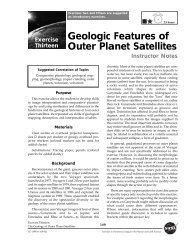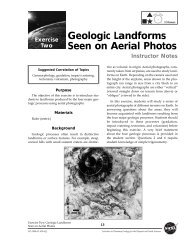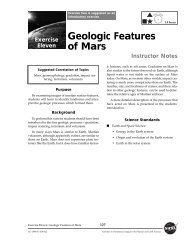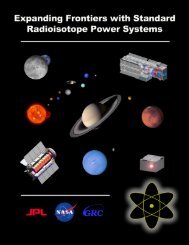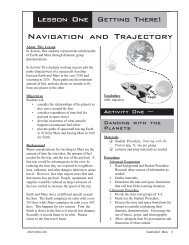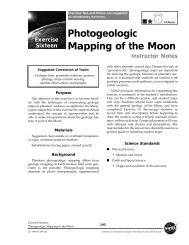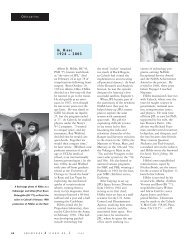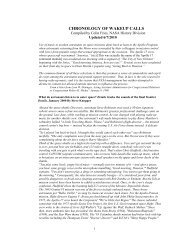Vision and Voyages for Planetary Science in the - Solar System ...
Vision and Voyages for Planetary Science in the - Solar System ...
Vision and Voyages for Planetary Science in the - Solar System ...
Create successful ePaper yourself
Turn your PDF publications into a flip-book with our unique Google optimized e-Paper software.
Def<strong>in</strong><strong>in</strong>g <strong>the</strong> Need<br />
Jon Miller, <strong>in</strong> his paper entitled Civic Scientific Literacy across <strong>the</strong> Life Cycle, states that only<br />
30 percent of <strong>the</strong> U.S. population is scientifically literate. 1 This scientific illiteracy extends even to<br />
<strong>the</strong> most basic facts about our universe. For example, <strong>the</strong> National <strong>Science</strong> Board estimates that more<br />
than a third of Americans do not underst<strong>and</strong> that Earth orbits <strong>the</strong> Sun. 2 The United States is los<strong>in</strong>g its<br />
scientific <strong>and</strong> technological competitiveness, a situation that can only be reversed if science literacy<br />
<strong>and</strong> proficiency become a national priority. 3<br />
The role that science can play <strong>in</strong> economic development was articulated <strong>in</strong> <strong>the</strong> NRC’s 2007<br />
<strong>and</strong> 2010 reports Ris<strong>in</strong>g Above <strong>the</strong> Ga<strong>the</strong>r<strong>in</strong>g Storm: Energiz<strong>in</strong>g <strong>and</strong> Employ<strong>in</strong>g America <strong>for</strong> a<br />
Brighter Economic Future 8 <strong>and</strong> Ris<strong>in</strong>g Above <strong>the</strong> Ga<strong>the</strong>r<strong>in</strong>g Storm, Revised: Rapidly Approach<strong>in</strong>g<br />
Category 5. 9 These reports argue that <strong>the</strong> science <strong>and</strong> technology that powers <strong>the</strong> U.S. economy is<br />
not adequately funded, <strong>and</strong> does not attract as many practitioners as it does <strong>in</strong> o<strong>the</strong>r countries. The<br />
specific recommendations from <strong>the</strong> first Ga<strong>the</strong>r<strong>in</strong>g Storm report can be succ<strong>in</strong>ctly summarized as:<br />
• Increase America’s talent pool by vastly improv<strong>in</strong>g K–12 science <strong>and</strong> ma<strong>the</strong>matics<br />
education;<br />
• Susta<strong>in</strong> <strong>and</strong> streng<strong>the</strong>n <strong>the</strong> nation’s commitment to long-term basic research;<br />
• Make <strong>the</strong> United States <strong>the</strong> most attractive sett<strong>in</strong>g <strong>in</strong> which to study <strong>and</strong> per<strong>for</strong>m<br />
research; <strong>and</strong><br />
• Ensure that <strong>the</strong> United States rema<strong>in</strong>s a lead<strong>in</strong>g place <strong>in</strong> <strong>the</strong> world to <strong>in</strong>novate.<br />
Exploration of <strong>the</strong> planets can play a key role <strong>in</strong> address<strong>in</strong>g <strong>the</strong>se challenges, because it is<br />
among <strong>the</strong> most excit<strong>in</strong>g <strong>and</strong> accessible scientific activities funded by NASA, <strong>and</strong> <strong>in</strong>deed by any<br />
government agency. NASA’s planetary program has a special opportunity, <strong>and</strong> <strong>the</strong>re<strong>for</strong>e a special<br />
responsibility, to reach out to <strong>the</strong> public. <strong>Planetary</strong> exploration research has today with many o<strong>the</strong>r<br />
areas of science, technology, eng<strong>in</strong>eer<strong>in</strong>g, <strong>and</strong> ma<strong>the</strong>matics: geology, chemistry, biology, aerospace<br />
eng<strong>in</strong>eer<strong>in</strong>g, high-per<strong>for</strong>mance comput<strong>in</strong>g, electrical eng<strong>in</strong>eer<strong>in</strong>g <strong>and</strong> advanced optics, <strong>and</strong> computer<br />
science. <strong>Planetary</strong> exploration offers a return on <strong>in</strong>vestment <strong>for</strong> <strong>the</strong> United States, by attract<strong>in</strong>g young<br />
people to science <strong>and</strong> technology careers <strong>and</strong> provid<strong>in</strong>g <strong>the</strong> k<strong>in</strong>d of education <strong>and</strong> tra<strong>in</strong><strong>in</strong>g that can<br />
help solve major societal challenges <strong>in</strong>volv<strong>in</strong>g science <strong>and</strong> technology. Public <strong>in</strong>terest <strong>in</strong> <strong>the</strong><br />
exploration of <strong>the</strong> solar system translates to opportunities to educate <strong>and</strong> <strong>in</strong>fluence future scientists,<br />
eng<strong>in</strong>eers, teachers, policy makers, <strong>and</strong> <strong>the</strong> public at large, through classroom <strong>in</strong>struction or <strong>in</strong><strong>for</strong>mal<br />
education.<br />
In addition to <strong>the</strong> Ga<strong>the</strong>r<strong>in</strong>g Storm report, <strong>the</strong> America COMPETES Act also highlighted<br />
three areas of importance to <strong>the</strong> nation; planetary exploration can contribute directly to <strong>the</strong>se areas.<br />
1. To streng<strong>the</strong>n research <strong>in</strong>vestment <strong>and</strong> to foster <strong>in</strong>novation <strong>and</strong> frontier research.<br />
<strong>Planetary</strong> exploration research is trans<strong>for</strong>mative at <strong>the</strong> most fundamental level, explor<strong>in</strong>g areas as farreach<strong>in</strong>g<br />
as <strong>the</strong> orig<strong>in</strong> of life, <strong>the</strong> orig<strong>in</strong>s of <strong>the</strong> solar system, <strong>the</strong> evolution of planetary environments,<br />
<strong>and</strong> <strong>the</strong> search <strong>for</strong> Earth-like planets <strong>in</strong> o<strong>the</strong>r solar systems. <strong>Planetary</strong> exploration can drive<br />
<strong>in</strong>novation <strong>in</strong> technology such as advanced sensors <strong>and</strong> data process<strong>in</strong>g.<br />
2. To streng<strong>the</strong>n educational opportunities <strong>in</strong> science, technology, eng<strong>in</strong>eer<strong>in</strong>g, <strong>and</strong><br />
ma<strong>the</strong>matics (<strong>and</strong> critical <strong>for</strong>eign languages). <strong>Planetary</strong> science has broad public appeal <strong>and</strong> vibrant<br />
1 Jon D. Miller, Civic Scientific Literacy across <strong>the</strong> Life Cycle, a paper presented at <strong>the</strong> annual meet<strong>in</strong>g of<br />
<strong>the</strong> American Association <strong>for</strong> <strong>the</strong> Advancement of <strong>Science</strong>, San Francisco, Cali<strong>for</strong>nia, February 17, 2007.<br />
2 The National <strong>Science</strong> Board, <strong>Science</strong> <strong>and</strong> Eng<strong>in</strong>eer<strong>in</strong>g Indicators 2006, National <strong>Science</strong> Foundation,<br />
Arl<strong>in</strong>gton, Va., available at http://www.nsf.gov/statistics/se<strong>in</strong>d06/pdf/volume1.pdf.<br />
3 NAS, NAE, IOM, Ris<strong>in</strong>g Above <strong>the</strong> Ga<strong>the</strong>r<strong>in</strong>g Storm,2007.<br />
PREPUBLICATION COPY—SUBJECT TO FURTHER EDITORIAL CORRECTION<br />
10-7



